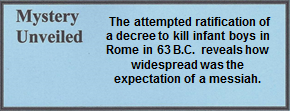03.05.15 63 B.C. Romans Order Attempts To Kill Infant Boys Because Of Prophecy Of A New-Born King
The expectation of a “super” king or messiah was not limited to the Jewish people.[1] Nearly all the people groups in the ancient Middle East were expecting an incredible personality who would bring peace and prosperity. The Romans and Parthians were both expecting the birth of a world ruler, and less than three decades later the Roman poet Virgil would write of it in one of his literary works.[2]
Another Roman historian, Suetonius, in his Life of Augustus, quoted Julius Marathus from his Life of the Emperor, saying there would be a world ruler coming soon. This is considered a reliable source since Marathus was a personal confidant of Augustus Caesar and, therefore, the account has a high degree of merit. Apparently, shortly before Marathus’ birth, there was a prophecy in Rome that a king would soon be born who would rule over the Roman people; a “king of the Romans.”[3] To obviate this danger to the Republic, in the year 63 B.C. the Roman Senate ordered all boy babies to be killed who were born in that year because some people claimed to have had prophetic dreams and seen astrological signs. In Roman society, unwanted infants were normally abandoned or exposed to the weather to die. However, several senators, whose wives were pregnant, took political action to prevent the ratification of the statute because each of them hoped that the prophecy might be in reference to their own child.[4] Ironically, in the same year, a child was born on September 23, who later became the first emperor of the Romans – Emperor Augustus.[5]

[1]. A lower case “m” is used for the word “messiah” because upper case “M” denotes deity, and no one expected God to come to earth in the form of a person.
[2]. Virgil, Eclogues, Eclogue IV: The Golden Age see 03.05.24.
[3]. Lindsay, The Origins of Astrology. 6.
[4]. Farrar, The Life of Christ. 21.
[5]. http://www.askelm.com/star/star001.htm Retrieved September 29, 2012. See also Appendix 1.